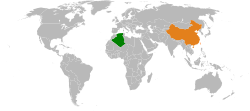Algeria–China relations
 | |
Algeria |
China |
|---|---|
Algeria–China relations refers to the current and historical relationship between Algeria and China. The two states have traditionally strong relations. In 2010, relations were considered the strongest of all Arab-Chinese relations.[1] Relations are focused primarily around commercial ties.[2]
Chinese development finance to Algeria
From 2000 to 2011, there are approximately 9 Chinese official development finance projects identified in Algeria through various media reports.[3] These projects range from an offer of a preferential loan of about 48 million USD in 2004,[4] to the construction of an opera house at a total cost of 300 million yuan in 2010.[5]
Energy
As of 1996, Algeria had two nuclear reactors, one of which was a heavy water research facility built by China. Algeria signed the Nuclear Non-Proliferation Treaty in June 1996.[6]
Diplomatic ties
Relation between Algeria and China are old. These relations are based on an idea of belonging to the Third World and then to the idea of developing countries to prove this rhetoric the former Chinese Ambassador of RPC in Algeria, Liu Yuhe, declared in 2010 “ You do not have to worry about GDP alone, there's the per capita income. In China it is $ 3,800 ... In Algeria it is $ 5,000. There are still many efforts ... China and Algeria remain developing countries”.[7]
Beyond words there is a kind of illegibility of Chinese diplomatic policy in Algeria and more generally in the Arab countries where China has no real position on the place of women, the state or religion according to Alice Eckman.[8] In fact, the Chinese diplomacy is defined more by the negative. They are established in sectors neglected by Europeans.
Concerning Algeria, pragmatism is also the key word in way. According to François Lafargue “Algeria plays a subtle game between Washington, Paris, Moscow and Beijing Algiers sees the United States as the power capable of helping them stabilize the region, France as a traditional trading and cultural partner, Moscow as an arms supplier, and Beijing as a diplomatic ally capable of accelerating its development without imposing constraints.”[9] This declaration is pretty accurate when we know that Hillary Clinton went in Algeria in 2014, to talk about security and described Algeria “ A dynamic catalyst to promote regional stability and security”. On the behalf of the revolution and the independence of Algeria, the Algerian government has never accepted a Chinese loan since 2000 to 2015 and financed all its modernisation thanks to gas and oil revenue. In reality Algiers behind its rhetoric, watched careful the situation of country like Sudan who only depend of Chinese support. They don’t have to have an exclusive relation with China to be considered as big player in the region. But As I said before, Pragmatism is the key word of Algerian diplomacy, as many countries Algeria has faced the decline in its revenues following the fall in the price of hydrocarbons. That’s the reason why Algeria has the past year, contracted a loan of 3.3 Billions of dollars to China for the construction of the port of El Hamdania[10].
France has been an essential economic partner for Algeria since the policy of Algiers of openness to international trade. Despite almost nonexistent economic ties with Algeria in 90’s China has manage to become the first supplier of Algeria in 2016 with an amount of 8,22 $ billions of imports (5,42$ billions for France)[11]. This event has aroused a lot of discussions and comments in Algerian media often optimistic, sometimes mistrustful about China.
References
- ^ China’s relations with Algeria catch attention Silk Road Economy, January 24, 2010
- ^ China’s Inroads into North Africa: An Assessment of Sino-Algerian Relations by Chris Zambellis, China Brief Volume: 10 Issue: 1, January 7, 2010
- ^ Austin Strange, Bradley C. Parks, Michael J. Tierney, Andreas Fuchs, Axel Dreher, and Vijaya Ramachandran. 2013. China’s Development Finance to Africa: A Media-Based Approach to Data Collection. CGD Working Paper 323. Washington DC: Center for Global Development.http://china.aiddata.org
- ^ Strange, Parks, Tierney, Fuchs, Dreher, and Ramachandran, China’s Development Finance to Africa: A Media-Based Approach to Data Collection.http://aiddatachina.org/projects/330
- ^ Strange, Parks, Tierney, Fuchs, Dreher, and Ramachandran, China’s Development Finance to Africa: A Media-Based Approach to Data Collection.http://aiddatachina.org/projects/523
- ^ Algeria-Nuclear Tie New York Times, June 3, 1996
- ^ "Interview of the former Chinese ambassador". Toutes les nouvelles de l'algérie. 21 August 2010. Retrieved 2017-03-24.
{{cite web}}: Cite has empty unknown parameter:|dead-url=(help) - ^ Chine-Algérie: Une relation singulière. Paris: Riveneuve éditions. 2014. p. 171. ISBN 978-2-36013-230-0.
- ^ François, Lafargue (2010). “La Chine en Afrique: Une réalité à nuancer” in Dounia N°3. Dounia.
- ^ "Algérie : prêt chinois de 3,3 milliards de dollars pour la construction du port d'El Hamdania".
{{cite web}}: Cite has empty unknown parameter:|dead-url=(help) - ^ "La Chine premier fournisseur de l'Algérie, forte baisse des échanges avec les pays de l'UMA". 29 January 2016.
{{cite web}}: Cite has empty unknown parameter:|dead-url=(help)
